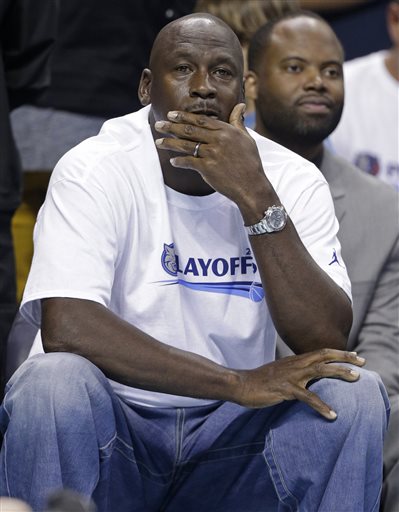Wiedmer: Jordan should explain his change
Thursday, May 8, 2014
I don't know what floats around in Michael Jordan's head or heart. Neither do you.
So there's nothing wrong with largely dismissing the quotes attributed to Jordan in the new book "Michael Jordan: The Life" about his views on race as those of a frustrated, angry teenager.
Yes, "I considered myself a racist at the time," will open some eyes and likely sell a few books for author Roland Lazenby. The second quote -- "Basically, I was against all white people" -- may boost sales even higher.
Especially in the wake of last week's justifiable condemnation of Los Angeles Clippers owner Donald Sterling's racist comments to his mistress, remarks that have earned him a lifetime ban from the NBA.
But since Lazenby has already admitted that the quotes were pulled from a 1992 Playboy Magazine article, and that Jordan never actually sat down for an interview with the author, it all also seems both a little stale and sensationalized at the same time.
Yet whenever and to whomever those quotes were originally expressed, is it not fair to ask Jordan that if it's true that he no longer embraces those views, why does he not? And though his mother is credited with changing that perspective, why did he not share that transformation during his powerful words concerning Sterling, of whom he said:
"As an owner, I'm obviously disgusted that a fellow team owner could hold such sickening and offensive views. As a former player, I'm completely outraged. There is no room in the NBA -- or anywhere else -- for the kind of racism and hatred that Mr. Sterling allegedly expressed. I am appalled that this type of ignorance still exists within our country and at the highest levels of our sport. In a league where the majority of players are African-American, we cannot and must not tolerate discrimination at any level."
Nothing in Jordan's jarring words concerning Sterling is necessarily out of bounds. Then again, shouldn't someone who's about to be quoted in a book as considering themselves a racist during their teen years let the rest of us in on that little secret before savaging Sterling?
Might it not have been more honorable and prudent to explain his racist past -- however brief, justified or both -- given that this book and these quotes were about to surface?
And how much less forgiving might the media be had this been Larry Bird or Rick Barry saying they were against all black people growing up?
Think that story would have left ESPN's front web page in less than 24 hours, much as the Jordan story did?
And maybe Jordan was nothing more than a frustrated teenager living in a small Southern town, concerned that he was never getting the fair shake he thought he deserved because of the color of his skin.
After all, the incident that reportedly pushed MJ over the edge was being called the N-word. Any African-American living below the Mason-Dixon line at that time probably heard the same word and bristled -- silently or otherwise -- similarly to His Airness. No one should blame them for that bitterness.
But that doesn't mean Jordan shouldn't clarify his past. When it changed. What he believes now. Why his beliefs then should be ignored now at the same time Sterling's are being dissected like a frog in an eighth grade biology class.
This isn't to say that Jordan has shown any signs as an adult of being a racist. He actually has more non-blacks on his Charlotte Bobcats roster (three) than Sterling has on the Clippers (two). One of Jordan's best friends is former Tennessee coach Buzz Peterson, who's not only white but also MJ's former roommate at UNC.
So maybe the story should be how Jordan got past such anger and bigotry as a youth to feel comfortable being appalled at the type of racism, hatred and ignorance that still exists within our country at the highest levels of his sport now that he's a 51-year-old adult.
That explanation would certainly be more interesting as revisiting the worrisome words of a teenaged Jordan. It might even provide Sterling a road map into the 21st century, which is where MJ long ago flew the game as a player but could possibly make a similar impact on society as an admitted former racist.
Contact Mark Wiedmer at mwiedmer@timesfreepress.com

